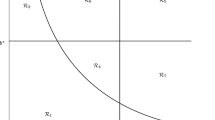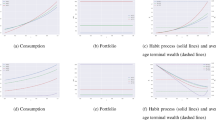Abstract
This paper studies an asymptotic solvability problem for linear quadratic (LQ) mean field games with controlled diffusions and indefinite weights for the state and control in the costs. The authors employ a rescaling approach to derive a low dimensional Riccati ordinary differential equation (ODE) system, which characterizes a necessary and sufficient condition for asymptotic solvability. The rescaling technique is further used for performance estimates, establishing an O(1/N)-Nash equilibrium for the obtained decentralized strategies.
Similar content being viewed by others
References
Huang M, Malhamé R P, and Caines P E, Large population stochastic dynamic games: Closed-loop McKean-Vlasov systems and the Nash certainty equivalence principle, Commun. Inform. Systems, 2006, 6(3): 221–252.
Lasry J M and Lions P L, Mean field games, Japan. J. Math., 2007, 2(1): 229–260.
Bauso D, Tembine H, and Basar T, Opinion dynamics in social networks through mean-field games, SIAM J. Control Optim., 2016, 54(6): 3225–3257.
Carmona R, Fouque J P, and Sun L H, Mean field games and systemic risk, Communications in Mathematical Sciences, 2015, 13: 911–933.
Chan P and Sircar R, Fracking, renewables, and mean field games, SIAM Review, 2017, 59(3): 588–615.
De Paola A, Angeli D, and Strbac G, Distributed control of micro-storage devices with mean field games, IEEE Transactions on Smart Grid, 2016, 7(2): 1119–1127.
Huang X, Jaimungal S, and Nourian M, Mean-field game strategies for optimal execution, Applied Mathematical Finance, 2019, 26(2): 153–185.
Lachapelle A and Wolfram M T, On a mean field game approach modeling congestion and aversion in pedestrian crowds, Transportation Research Part B: Methodological, 2011, 45(10): 1572–1589.
Lacker D and Zariphopoulou T, Mean field and n-agent games for optimal investment under relative performance criteria, Math. Finance, 2019, 29(4): 1003–1038.
Laguzet L and Turinici G, Individual vaccination as Nash equilibrium in an SIR model with application to the 2009–2010 influenza A (H1N1) epidemic in France, Bulletin of Mathematical Biology, 2015, 77(10): 1955–1984.
Li Z, Reppen A M, and Sircar R, A mean field games model for cryptocurrency mining, arXiv: 1912.01952, 2019.
Ma Z, Callaway D S, and Hiskens I A, Decentralized charging control of large populations of plug-in electric vehicles, IEEE Transactions on Control Systems Technology, 2013, 21(1): 67–78.
Salhab R, Malhamé R P, and Ny J L, A dynamic game model of collective choice in multiagent systems, IEEE Trans. Autom. Control, 2018, 63(3): 768–782.
Swiecicki I, Gobron T, and Ullmo D, Schrödinger approach to mean field games, Physical Review Letters, 2016, 116(12): 128701.
Wang B and Huang M, Mean field production output control with sticky prices: Nash and social solutions, Automatica, 2019, 100: 90–98.
Yin H, Mehta P G, Meyn S P, et al., Synchronization of coupled oscillators is a game, IEEE Trans. Autom. Control, 2012, 57(4): 920–935.
Bensoussan A, Frehse J, and Yam S C P, Mean Field Games and Mean Field Type Control Theory, Springer, New York, 2013.
Caines P E, Huang M, and Malhamé R P, Mean field games, Eds. by Başar T and Zaccour G, Handbook of Dynamic Game Theory, Springer, Berlin, 2017, 345–372.
Cardaliaguet P, Notes on Mean Field Games, University of Paris, Dauphine, 2013.
Carmona R and Delarue F, Probabilistic Theory of Mean Field Games with Applications I–II, Springer, Cham, Switzerland, 2018.
Bensoussan A, Sung K C J, Yam S C P, et al., Linear-quadratic mean-field games, J. Optim. Theory Appl., 2016, 169(2): 496–529.
Huang J, Wang S, and Wu Z, Backward mean-field linear-quadratic-gaussian (LQG) games: Full and partial information, IEEE Trans. Autom. Control, 2016, 61(12): 3784–3796.
Huang M, Caines P E, and Malhamé R P, Large-population cost-coupled LQG problems with non-uniform agents: Individual-mass behavior and decentralized ε-Nash equilibria, IEEE Trans. Autom. Control, 2007, 52(9): 1560–1571.
Li T and Zhang J F, Asymptotically optimal decentralized control for large population stochastic multiagent systems, IEEE Trans. Autom. Control, 2008, 53(7): 1643–1660.
Wang B C and Zhang J F, Mean field games for large-population multiagent systems with Markov jump parameters, SIAM J. Control Optim., 2012, 50(4): 2308–2334.
Bardi M and Priuli F S, Linear-quadratic N-person and mean-field games with ergodic cost, SIAM J. Control Optim., 2014, 52(5): 3022–3052.
Moon J and Başar T, Linear quadratic risk-sensitive and robust mean field games, IEEE Trans. Autom. Control, 2017, 62(3): 1062–1077.
Huang J and Huang M, Robust mean field linear-quadratic-Gaussian games with unknown L2-disturbance, SIAM J. Control Optim., 2017, 55(5): 2811–2840.
Tchuendom R F, Uniqueness for linear-quadratic mean field games with common noise, Dyn. Games Appl., 2018, 8(1): 199–210.
Huang M, Large-population LQG games involving a major player: The Nash certainty equivalence principle, SIAM J. Control Optim., 2010, 48(5): 3318–3353.
Nguyen S L and Huang M, Linear-quadratic-Gaussian mixed games with continuum-parametrized minor players, SIAM J. Control Optim., 2012, 50(5): 2907–2937.
Bensoussan A, Chau M H M, Lai Y, et al., Linear-quadratic mean field Stackelberg games with state and control delays, SIAM J. Control Optim., 2017, 55(4): 2748–2781.
Caines P E and Kizikale A C, ε-Nash equilibria for partially observed LQG mean field games with a major player, IEEE Trans. Autom. Control, 2017, 62(7): 3225–3234.
Huang M and Zhou M, Linear quadratic mean field games: Asymptotic solvability and relation to the fixed point approach, IEEE Trans. Autom. Control, 2020, 65(4): 1397–1412.
Ma Y and Huang M, Linear quadratic mean field games with a major player: The multi-scale approach, Automatica, 2020, 113(3): 108774.
Huang M and Yang X, Linear quadratic mean field social optimization: Asymptotic solvability and decentralized control, Appl. Math. Optim., 2021, (accepted).
Nourian M and Caines P E, ε-Nash mean field game theory for nonlinear stochastic dynamical systems with major and minor agents, SIAM J. Control Optim., 2013, 51(4): 3302–3331.
Basna R, Hilbert A, and Kolokoltsov V, An epsilon-Nash equilibrium for non-linear Markov games of mean-field-type on finite spaces, Communications on Stochastic Analysis, 2014, 8(4): 449–468.
Cardaliaguet P, Delarue F, Lasry J M, et al., The master equation and the convergence problem in mean field games, arXiv: 1509.02505, 2015.
Huang M and Zhou M, Linear quadratic mean field games — Part I: The asymptotic solvability problem, Proc. 23rd Internat. Symp. Math. Theory Networks and Systems, Hong Kong, China, July, 2018, 489–495.
Huang M and Yang X, Linear quadratic mean field games: Decentralized O(1/N)-Nash equilibria, arXiv: 2107.09168, 2021.
Yosida K, Functional Analysis, Springer-Verlag, Berlin, 6th edition, 1980.
Pham H, Continuous-Time Stochastic Control and Optimization with Financial Applications, Springer Science & Business Media, Berlin, 2009.
Yong J and Zhou X Y, Stochastic Controls: Hamiltonian Systems and HJB Equations, SpringerVerlag, New York, 1999.
Author information
Authors and Affiliations
Corresponding authors
Additional information
This research was supported by Natural Sciences and Engineering Research Council (NSERC) of Canada.
Rights and permissions
About this article
Cite this article
Huang, M., Yang, X. Linear Quadratic Mean Field Games: Decentralized O(1/N)-Nash Equilibria. J Syst Sci Complex 34, 2003–2035 (2021). https://doi.org/10.1007/s11424-021-1266-y
Received:
Published:
Issue Date:
DOI: https://doi.org/10.1007/s11424-021-1266-y




